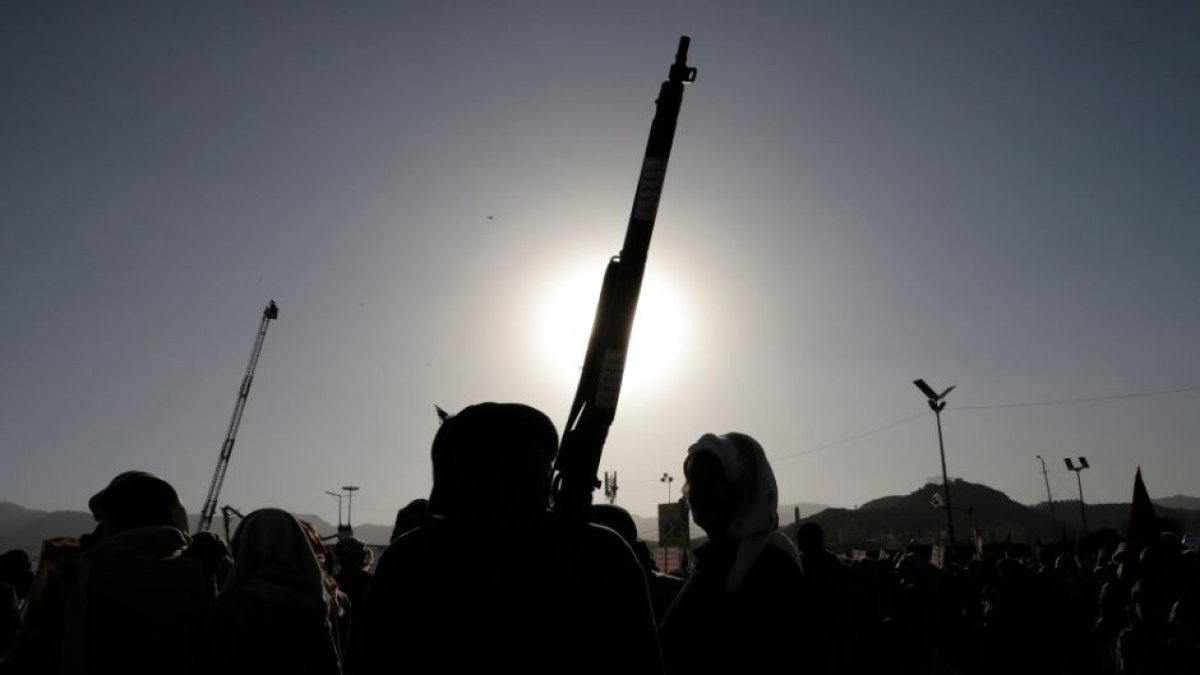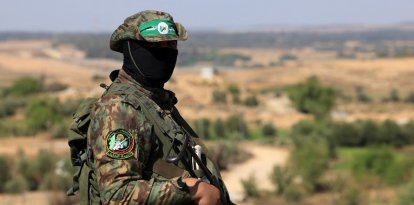Houthis, the terrorists unsettling the Red Sea
The Houthi militia grew as more and more young people joined the cause in the first Arab Spring protests in 2011, calling for an end to Saleh's regime in Yemen.

(Cordon Press)
The Houthi movement, also called Ansarallah (Supporters of God), is one of the sides in the Yemeni civil war, which emerged in the 1990s when Hussein al-Houthi founded the Young Believers, a religious revivalist movement of the centuries-old sect of Zaidis who ruled Yemen for centuries but were marginalized when the Sunni regime came to power after the 1962 civil war. The al-Houthi movement was founded to represent the Zaidis and resist the Sunnism of Saudi Arabia's Wahhabis. Its followers were renamed Houthis and are now believed to be armed and trained by Iran.
Ali Abdullah Saleh, president of Yemen after the unification of North and South Yemen in 1990, supported the Young Believers until factional confrontation made them a threat to him. But in 2003, when Saleh supported the U.S. invasion of Iraq, the Young Believers objected and the relationship reached a point of no return which, for al-Houthi, was an opportunity to organize mass demonstrations. After months of violence Saleh issued a warrant for his arrest and al-Houthi was killed in September 2004 by Yemeni forces, but his movement lives on.
The Houthi militia grew as more and more young people joined the cause in the first Arab Spring protests in 2011, calling for an end to the Saleh regime. They struck again in 2014, taking control of parts of Sana'a, the Yemeni capital, and stormed the presidential palace in 2015, when they attempted to seize full power, taking advantage of popular discontent at the government's decision to end fuel subsidies. They quickly seized the Red Sea port of Hodeidah, dissolved the Yemeni Parliament and formed a Revolutionary Committee to establish a de facto system of self-rule. President al Hadi fled to Saudi Arabia from where he launched a war against the Houthis that took on a regional tinge as Saudi Arabia and the United Arab Emirates joined him in a coalition to return al Hadi to power.
Although outgunned by the coalition, fast planes and tanks failed to dislodge the Houthis who aligned themselves with Iran. With small boats they smuggled weaponry, including ballistic missiles and drones that were used in several high-profile attacks in Saudi Arabia itself. But the Saudis themselves had internal disputes, and the conflict in the area resulted in a stalemate. The Houthis, in turn, began coordinating with other pro-Iranian terrorist groups. In 2018 a coalition and Yemeni government offensive nearly tipped the balance with U.N. endorsement, but the Houthis were inexplicably left in control of the west coast and were able to continue receiving weaponry from Iran.
Iran has provided them with weapons and technology for sea mines, ballistic and cruise missiles and unmanned aerial vehicles (UAVs or drones), according to several reports in 2021, when a fragile ceasefire was signed. The group has a strong grip on the areas it controls, while those controlled by the government-in-exile are plagued by rival militias. The al-Houthi doctrine established a militarized and brutal state sustained by strong internal intelligence and the threat of the external enemy. The current popularity of the regime is difficult to gauge given the level of repression, and since the ceasefire, the Houthis have consolidated their iron grip on most of northern Yemen. The Houthis are part of Iran's so-called "Axis of Resistance," an alliance of anti-Israeli and anti-Western terrorists, along with Hamas and Hezbollah. Although it has also rehearsed other narratives so as not to come across as mere puppets of Tehran, flaunting a fundamentalist religious nationalism, claiming that they are in fact defending Yemen from external aggression.
The conflict in Yemen has spread to plunge the population into a massive humanitarian crisis. The Saudi Arabian coalition is blockading Yemeni ports, preventing the entry of humanitarian aid. In recent years, civil servants and other state-paid workers have not received adequate salaries. Employees often receive half of their salary two months late, and in response to this, Yemenis post on their social media that local professionals have to take on side jobs to make ends meet. Currently, 24 million people, 75% of the Yemeni population, are in need of humanitarian aid and protection. Nearly 20 million are highly food insecure, and 18 million lack access to basic health services. The United Nations maintains that the war in Yemen has become the world's worst humanitarian crisis. According to U.N. data, nearly a quarter of a million people have died during the conflict.
In the face of the crisis, negotiations between Saudi Arabia and Houthi leaders to end the war began in April 2023 but stalled in October, when the Houthis attacked Israel, aligning themselves with Hamas as part of the Axis of Resistance strategy. On Oct. 20, they launched missiles into Israel that were intercepted by a U.S. ship, and have confirmed responsibility for others intercepted by Israel. Drone and rocket exchanges with the U.S. Navy and U.K. Navy have become a global danger. The Houthi movement has taken things to a point of no return in the Red Sea by ignoring all calls to calm the situation, and have doubled down by using medium range ballistic missiles against Israel, firing a barrage of projectiles at Eilat in early December 2023. While the Houthis may lack Hezbollah's capabilities, their attacks on commercial vessels in the Red Sea have made them a global threat.
It is possible that on the regional chessboard the Houthis are mainly playing an internal game, and that the confrontation against Israel is just to position themselves on the radicalized geopolitical agenda. But the truth is that they are now embroiled in a conflict that has escalated independently, and the U.S. and British armies are attacking Houthi targets as the group's actions in the Red Sea have complicated operations for the world's largest shipping and oil companies. Major shipping companies Maersk, Hapag-Lloyd, CMA CGM Group and Evergreen have already warned of their difficulties in the Red Sea, as has oil giant BP. The Palestinian cause may help the Houthis gain legitimacy in their protracted civil war, though it remains to be seen whether their bosses in Iran will reward their opportunism and political savvy or leave them to face their crusade to ruin trade in the Red Sea alone.

























